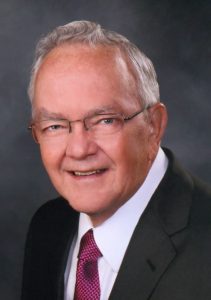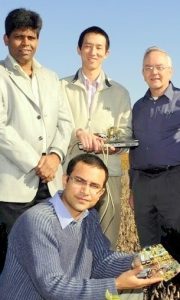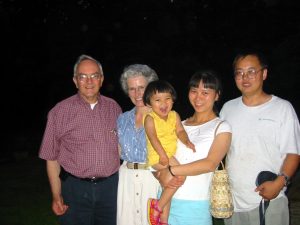 Robert Weber, professor emeritus and alumnus of Iowa State University‘s Department of Electrical and Computer Engineering (ECpE), passed away in Des Moines, Iowa, on Nov. 21, 2018, at the age of 76.
Robert Weber, professor emeritus and alumnus of Iowa State University‘s Department of Electrical and Computer Engineering (ECpE), passed away in Des Moines, Iowa, on Nov. 21, 2018, at the age of 76.
Weber received his bachelor’s degree, master’s degree and Ph.D. from Iowa State in Electrical Engineering between the years of 1963-67. While a student at ISU, Weber was a member of Sigma Xi, a national honor society for research scientists and engineers; and Tau Beta Pi, an engineering honor society. He also was a Fellow of the Institute of Electrical and Electronics Engineers (IEEE).
Weber had a 25-year career with Rockwell Collins, now Collins Aerospace, before becoming an ECpE professor in 1988. At Iowa State, he worked with the Microelectronics Research Center (MRC) and the Analog and Mixed-Signal VLSI Design Center and was named the David C. Nicholas Professor, a title he held from 2002-09. Weber received the Warren B. Boast Undergraduate Teaching Award three times, in 1996, 2002 and 2005. He retired from ISU in 2010 but stayed active in the department, continuing his passion for research and mentoring young engineers as professor emeritus until his death.
“Professor Weber was a valuable colleague. He and I came ISU concurrently in the late 1980s from industry, he from Rockwell and I from Polaroid. The two of us together worked to make the Microelectronics Research Center into a productive laboratory for new electronic and optical devices,” said Vikram Dalal, Anson Marston Distinguished Professor and Thomas M. Whitney Professor in Electrical and Computer Engineering. Dalal is also the director of the MRC.
“Early in his career at ISU, Dr. Weber was instrumental in the work at MRC on new sensor devices based on thin film resonators. Dr. Weber also obtained significant donations of research equipment from industry to MRC, which has benefited many students. Many graduate students and P&S [professional and scientific] scientists worked with him and benefited greatly from his exceptional knowledge in the field of microwave devices and circuits,” Dalal said. “In addition to his work at Iowa State, Dr. Weber also volunteered in Zambia (in Africa) to improve the education and health facilities in that country. He was always willing to help everyone, and we all benefited greatly from his knowledge, wisdom and friendship.”
We received several memories from Robert Weber’s friends and colleagues, which we are happy to share below. If you would like to contribute a memory, please send an email here or add a comment at the bottom of this story.
“Bob and I worked on many joint projects at the Microelectronics Research Center and in the EE Department. I knew him from his days at Collins Radio (now Collins Aerospace) in Cedar Rapids. He was a real hardware engineer’s engineer. He was also a pack rat like me, maybe worse. He had shelves and shelves of test equipment and parts in his lab. I was cleaning out my office in preparation for my move to become ECE Department Head at the University of Minnesota Duluth in 1998. He arranged with the ISU EE powers-that-be to trade his old office for mine; more room, more book shelves, and more windows. I stacked piles and piles of journals, technical magazines, textbooks, lab stuff, and parts outside my office in the hallway since students like to sort through the materials and take what they want. After many hours of backbreaking labor, I had finished the cleaning, and Bob stopped by and asked, ‘What are you going to do with that stuff?’ I replied that my moving allowance was such that I couldn’t take it all with me. He started going through the piles of stuff and finally said, ‘This is all good stuff. Don’t throw it away. Let’s move it back in to my new office.’ We did, and hopefully the floor didn’t collapse.”
—Stanley Burns, Professor and former Department Head of Electrical Engineering at the University of Minnesota Duluth; former Associate Dean of the UMD Swenson College of Science and Engineering; former Professor of Electrical and Computer Engineering at Iowa State University

“I have had the fortune of a long and productive association with Dr. Weber. At the time I joined the ISU ECpE Department in 2002, sensor networks were coming up the research horizon. Being in Iowa, it occurred to me that making sensors for agriculture may be cool, although I had little idea at that time. I started thinking and reading about the problem, putting a team together, and sending out the ideas for funding as early as 2003, eventually winning the first award on the topic from NSF in 2006. At this time, I was on the Dept. P&T committee, chaired by Dr. Weber. Our hallway interactions about our ongoing project made it clear that Dr. Weber would be the best addition to take our project to a next level. Dr. Weber became a CoPI in a second incarnation of the project, which started in 2009, and thus began our close association of weekly meetings with joint students. Although he retired a year later in 2010, he and I enjoyed the project and our collaboration. He continued to be on campus on a weekly basis, implementing the project ideas and mentoring the jointly supervised Ph.D. students. This continued for nearly 10 years, and until the week before his sudden departure. Our last research interaction was on Nov. 15, 2018, the Thursday before the Thanksgiving week, the week in which he left us. Over this period, he and I were successful in getting two additional external (NSF) and two additional internal (RIF) funding, completed the co-supervision of two Ph.D. students, and a third in progress on the respective topics: A first-of-a-kind in-soil wireless moisture and salinity sensor (by Gunjan Pandey, now with Skyworks), whose publication (2014) and patent (2018) together have already been cited 157 times; a broadband and broad-amplitude motion energy harvester (by Kanishka Singh, joined NextEra Energy, now with his own startup)— Dr. Weber thought of the idea that perhaps the earth movement from thunder could be used to supplement the power requirements for the in-soil sensors, which was published in 2015 and its patent was approved recently (Oct. 2018); and an impedance spectroscopy based in-soil nutrient measurement approach (by Bhuwan Kashyap) — an external proposal is pending on this idea. Dr. Weber helped with the electronics portion of a fourth Ph.D. project, a first-of-a-kind soil nutrient sensor, published in 2018 with its patent under review. All these works were immediately noticed by several industries in the ag sector, and he and I made numerous trips and presentations to different industries, one of which signed options licensing agreements for two of the patents (soil moisture and soil nutrient sensing, respectively). The agri-sensor work is ongoing and has also branched into biosensing and environmental sensing. Our first sensor work (of in-soil moisture and salinity) was also noted by Texas Instruments, a leading electronics industry, which invited us for collaboration on new projects and has awarded gift funding for supporting the collaboration. Dr. Weber has been a father figure to our sensors related research, and he will remain forever a guiding force for our group as we carry forward his legacy. He is among the finest scholars and persons I have had the fortune to interact with and learn from. May he always keep smiling.
—Ratnesh Kumar, Murray J. and Ruth M. Harpole Professor in Electrical and Computer Engineering at Iowa State University
“Dr. Bob Weber hired me in 1980, as a fresh-out electrical engineer for the Microwave Technology Department of the Advanced Technology and Engineering Group of Rockwell International (formerly Collins Radio). Bob had already achieved legionary status within the company at that time. It was a privilege to be his mentee and collaborate with him. What impressed me the most was Bob’s ability to take the somewhat disparate (at the time) sub-disciplines of electrical engineering, such as antennas, microwave circuits, electromagnetics, control systems, analog circuits, digital circuits and digital signal processing, etc., and uniquely synthesize this deep knowledge to cleverly solve microwave technology challenges. Rob was a true renaissance man and an ‘out-of-the-box thinker’ before this term became popular.”
—Jim West, Technical Fellow, Antenna & RF Systems/Mission Systems/Advanced Technology Engineering at Collins Aerospace

“Dr.Weber is such a great educator and meticulous engineer that I and many other students have had lifelong benefits from his knowledge, experience, diligence and wisdom. I got to know Dr. Weber long before I officially became his student. I was in Dr. Udpa’s group at the beginning, and every day I passed Dr. Weber’s office and labs on the 3rd floor of Durham Center. When he first spotted me, he would greet me with a smile: ‘Ha… Another new student.’ He then introduced himself and asked for my information, and said, ‘You may take full use of our labs.’ At that moment, my thought was, wow, this professor must be very good at soldering stuff. Of course later I learned he was from Rockwell Collins before becoming a professor, and we chatted more in elevator, on hallway, in offices, and I got more and more respect for his passion in teaching and experimenting. So when the opportunity came for me to change a group, I stepped in his office and asked if I could be his student to finish my degree, and he smiled and said, ‘OK, then come in!’ Only with direct daily interaction with Dr. Weber could I truly understand how he dedicated himself in teaching and training curious yet sometime careless youngsters like me into creative and disciplined engineers. I remember in his Microwave Engineering class, there’s a lab session for amplifier design; I thought I put every component correct, but just no output. While I was frustrated not being able to find out why, he asked me, ‘Did you put the bias correctly?’ I said, ‘Yes, I have the right voltage here.’ He said, ‘Are you sure? Where is your DC-blocking capacitor?’ I said, ‘It’s right there… Oh my God! It’s shorted!’ His response: ‘As an electrical engineer, a short is an unforgivable mistake… You need to be very careful with your equipment and components. Don’t let that happen ever again.’ Years have passed, but his soft yet very firm words, every one of them, are still hanging vividly in my ears. After leaving Ames and Dr. Weber with my Ph.D. in 2004, I have moved from east coast to west coast while pursuing my career. What I’ve learned from him is invaluable with me all the time. His faith in God, love for family, fascination for engineering and passion for perfection are priceless treasures for every one of us. May he rest in peace, and may his family find comfort knowing that he is home. God Bless.”
—Jie Long, Iowa State Ph.D. ’04
“What I remember most about Dr. Weber is the incredible passion he had for teaching and helping students learn. He was always willing to stay after class to answer questions and clarify understanding. He was one of the best at teaching the theory and then teaching how to apply it in the real world. The classes that I took from Dr. Weber were among the most valuable of any classes in my undergraduate and graduate programs. His passion for microwave electronics inspired me to pursue a master’s degree focused in that area, and I had the good fortune of being a teaching assistant for him. Without question, he had a big impact on the success of my career, and I am very saddened to learn of his passing.”
—Joe Ellerbach, Iowa State BSEE 1990 and MEngEE 1991
“Robert Weber’s mentorship as professor went above the bar and can be witnessed by numerous students in the industry, making meaningful impact to everyone’s daily life. He believed in the concept of ‘give man a fish, you feed him for day; teach man to fish, you feed him for lifetime.’ I was recently asked how I derive my ideas. My reply was that an idea is formed by culmination of previous experience. Dr. Weber was a significant experience for numerous amounts of students. Most recently, I had a chance to attend a distinguished lecture by one of Robert’s first students, Charles Campbell. We joked about how Robert used to compare devices physics to farm activities, such as cow drinking water from bucket. Robert Weber truly cared about Iowa as a community and in terms of economic success. A significant amount of his research activities centered on improving Iowa’s small and large businesses.”
—Shannon Wanner, Principle Design Engineer